
-
 Uruguay bucks 2024 global warming trend
Uruguay bucks 2024 global warming trend
-
Last 2 years crossed 1.5C global warming limit: EU monitor

-
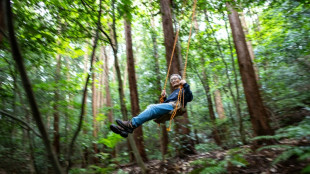 Japan 'poop master' gives back to nature
Japan 'poop master' gives back to nature
-
US Supreme Court to hear TikTok ban case
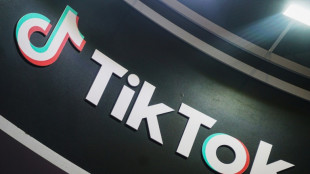
-
 US Fed's December rate cut should be its last for now: official
US Fed's December rate cut should be its last for now: official
-
Paris Hilton among celebrities to lose homes in LA fires
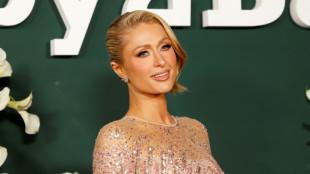
-
 Airbus boosts plane deliveries in 2024
Airbus boosts plane deliveries in 2024
-
Ubisoft reviews restructuring options, postpones new Assassin's Creed

-
 Lamborghini sets new sales record amidst hybrid push
Lamborghini sets new sales record amidst hybrid push
-
Lebanon army chief Aoun becomes president after two-year vacancy

-
 US emissions stagnated in 2024, challenging climate goals: study
US emissions stagnated in 2024, challenging climate goals: study
-
Lebanon army chief short of required majority in first round of president vote

-
 Global stock markets mixed tracking US rates outlook
Global stock markets mixed tracking US rates outlook
-
Lebanon meets to finally elect president after two-year vacancy

-
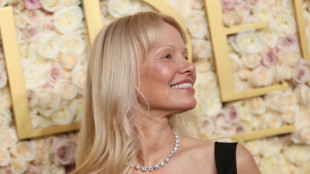 Celebrities flee Los Angeles fires, lose houses as Hollywood events scrapped
Celebrities flee Los Angeles fires, lose houses as Hollywood events scrapped
-
Japan startup hopeful ahead of second moon launch
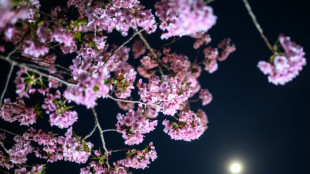
-
 Ukraine allies to hold last defence meet before Trump takes office
Ukraine allies to hold last defence meet before Trump takes office
-
Myanmar military adopts anti-junta fighters' drone tactics
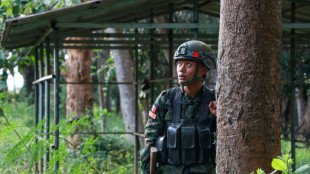
-
 CES tech looks to help world's aging population
CES tech looks to help world's aging population
-
Rubber tappers forge sustainable future in Amazon

-
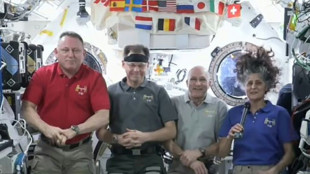 US astronauts upbeat seven months into eight-day mission
US astronauts upbeat seven months into eight-day mission
-
Extreme weather, suburban sprawl fuel LA's wildfires
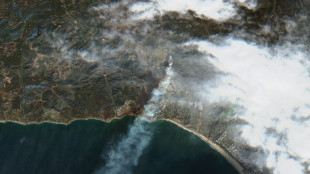
-
 Political chess or true beliefs? Zuckerberg's surprise Trump pivot
Political chess or true beliefs? Zuckerberg's surprise Trump pivot
-
US Fed officials concerned over 'stalled' disinflation, tariffs: minutes

-
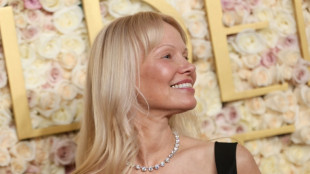 Celebrities flee Los Angeles fires as Hollywood events scrapped
Celebrities flee Los Angeles fires as Hollywood events scrapped
-
Several US Fed officials concerned over 'stalled' disinflation: minutes

-
 US tech titans ramp up pressure on EU
US tech titans ramp up pressure on EU
-
'Wicked' tops SAG Awards nominations

-
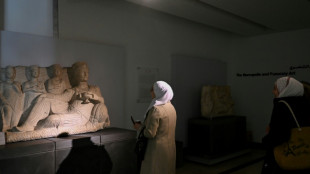 Safe from looting, Damascus museum reopens a month after Assad's fall
Safe from looting, Damascus museum reopens a month after Assad's fall
-
Award-winning migrant actor earns visa to stay in France -- as a mechanic

-
 Celebrities forced to flee Los Angeles blazes
Celebrities forced to flee Los Angeles blazes
-
US tariff and inflation fears rattle global markets

-
 US private sector hiring undershoots expectations: ADP
US private sector hiring undershoots expectations: ADP
-
US tariffs unlikely to have 'significant' inflation impact: Fed official

-
 Lebanon leaders in talks for new bid to elect president
Lebanon leaders in talks for new bid to elect president
-
Antarctic sea ice rebounds from record lows: US scientists

-
 Can EU stand up to belligerent Big Tech in new Trump era?
Can EU stand up to belligerent Big Tech in new Trump era?
-
US, Canadian and Australian travellers now face UK entry fee

-
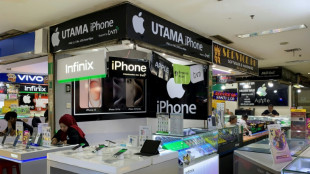 Indonesia upholds iPhone 16 sales ban after Apple offers $1 bn investment
Indonesia upholds iPhone 16 sales ban after Apple offers $1 bn investment
-
UK's Catherine turns 43 hoping for better year
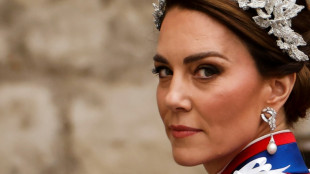
-
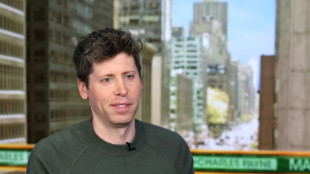 OpenAI chief Sam Altman denies sister's sexual abuse accusations
OpenAI chief Sam Altman denies sister's sexual abuse accusations
-
Germans turn to balcony solar panels to save money

-
 Samsung warns fourth-quarter profit to miss forecasts
Samsung warns fourth-quarter profit to miss forecasts
-
Brazil gears up for first climate conference in Amazon

-
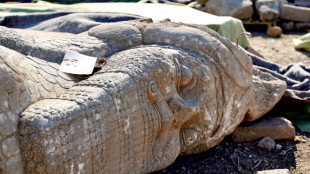 Iraqi archaeologists piece together ancient treasures ravaged by IS
Iraqi archaeologists piece together ancient treasures ravaged by IS
-
Big Tech rolls out the red carpet for Trump
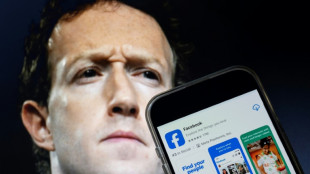
-
 Former US president Carter lies in state after somber Washington procession
Former US president Carter lies in state after somber Washington procession
-
US company Firefly Aerospace to launch for Moon next week
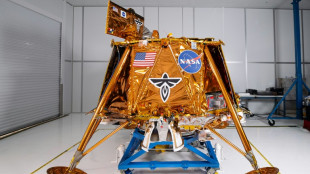
-
 No proof fentanyl produced in Mexico, president says
No proof fentanyl produced in Mexico, president says
-
Biotech Startups Get a Boost: ZAGENO and Hatch.Bio Labs Partner to Streamline Lab Operations


Six African countries to get own mRNA jab production
Six African countries have been chosen to establish their own mRNA vaccine production, the World Health Organization said Friday, with the continent largely shut out of access to Covid jabs.
Egypt, Kenya, Nigeria, Senegal, South Africa and Tunisia were selected as the first recipients of technology from the WHO's global mRNA vaccine hub, in a push to ensure Africa can make its own jabs to fight the Covid and other diseases.
"No other event like the Covid-19 pandemic has shown that reliance on a few companies to supply global public goods is limiting, and dangerous," WHO chief Tedros Adhanom Ghebreyesus said.
"The best way to address health emergencies and reach universal health coverage is to significantly increase the capacity of all regions to manufacture the health products they need."
Tedros has continually called for equitable access to vaccines in order to beat the pandemic, and rails against the way wealthy nations have hogged doses, leaving Africa lagging behind other continents in the global vaccination effort.
A ceremony marking the mRNA tech transfer announcement was to be held Friday in Brussels at the summit between the European Union and the African Union.
European Commission chief Ursula von der Leyen said: "We have been talking a lot about producing mRNA vaccines in Africa. But this goes even beyond. This is mRNA technology designed in Africa, led by Africa and owned by Africa."
- Self-reliance -
Currently only one percent of the vaccines used in Africa are produced on the continent of some 1.3 billion people.
The WHO set up a global mRNA technology transfer hub in South Africa last year to support manufacturers in low- and middle-income countries to produce their own vaccines.
The global hub's role is to ensure that manufacturers in those nations have the know-how to make mRNA vaccines at scale and according to international standards.
As used in the Pfizer/BioNTech and Moderna Covid-19 vaccines, mRNA technology provokes an immune response by delivering genetic molecules containing the code for key parts of a pathogen into human cells.
Primarily set up to address the Covid-19 pandemic, the global hub has the potential to expand manufacturing capacity for other vaccines and products, such as insulin to treat diabetes, cancer medicines and, potentially, vaccines for diseases such as malaria, tuberculosis and HIV.
The scheme's ultimate goal is to spread capacity for national and regional production to all health technologies.
- 'Mutual respect' -
The WHO said it would work with the first six countries chosen to develop a roadmap of training and support so they can start producing vaccines as soon as possible. Training will begin in March.
The South African hub is already producing mRNA vaccines at laboratory scale and is currently scaling up towards commercial scale.
South African President Cyril Ramaphosa said Friday's announcement "means mutual respect, mutual recognition of what we can all bring to the party, investment in our economies, infrastructure investment and, in many ways, giving back to the continent".
French President Emmanuel Macron said supporting African health sovereignty was one of the key goals of starting up local production, "to empower regions and countries to fend for themselves, during crises, and in peace time".
More than 10.4 billion Covid-19 vaccine doses have been administered around the world, with nearly 62 percent of the global population having received at least one shot.
However, just 11.3 percent of Africans had been fully immunised by the start of February.
C.Peyronnet--CPN
